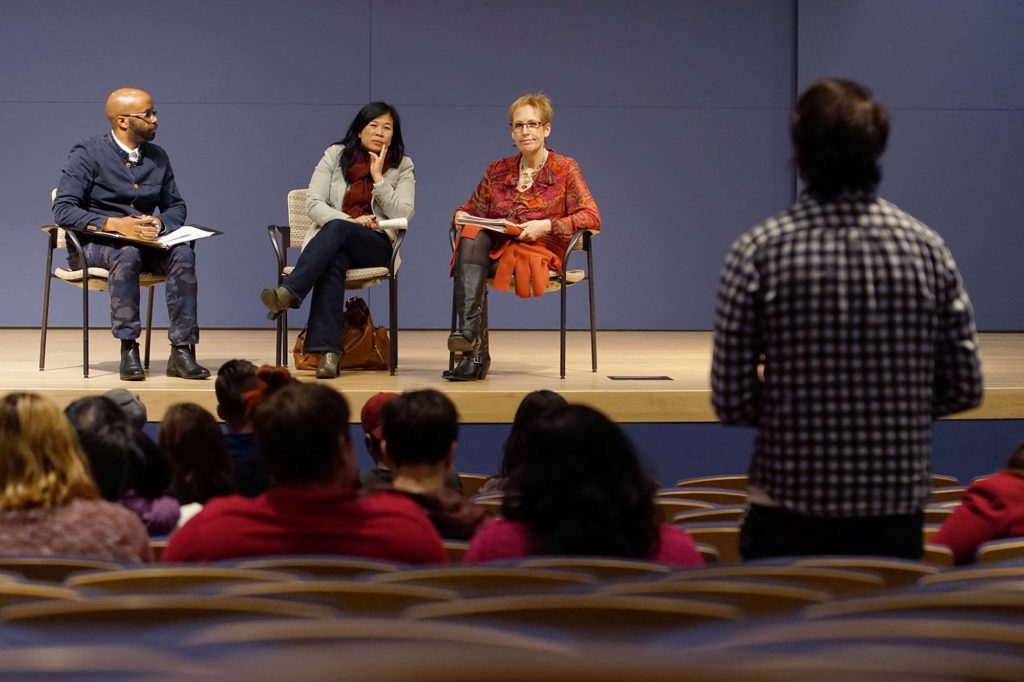Moral Mondays hosted a panel this month that explored what it means for Seattle to be a “sanctuary city.”

Tyrone Brown, Cuc Vu and Gail Stone describe what it means for Seattle to be a Sanctuary City.
“It’s actually not a legal definition,” said Cuc Vu, Director of the Office of Immigrant and Refugee Affairs for the city of Seattle. “But it’s cities with policies, or practices in place, of non-cooperation with law enforcement about federal immigration law.”
There is undoubted tension and concern surrounding the safety and livelihood of Seattle residents claiming immigrant status, or representing marginalized communities.
Although President-elect Trump has not officially been inaugurated, his 100-day plan already poses a potential threat to the lives of millions.
As a sanctuary city, Seattle wants to continue to support and finance the wellbeings of all communities, despite federal disagreement.
“Our objective leaders are saying ‘we stand with people, and we will take on this fight, and we will need absolutely everyone who resides in our county to be with us on that.’ It’s going to take a lot of people to keep this issue on the front line, and keep reminding people that this issue means a lot,” said Gail Stone, King County Law and Justice Policy Advisor.
Vu said that they will avoid involving local law enforcement.
“We will not employ our local law enforcement to do these federal immigration changes because it’s not a matter of public safety and it’s not what we stand for,” Vu said.
Vu also went on to talk about formatting a Citizenship Day to connect immigrant and refugee families with the legal means to protect themselves, understand immigration law or work toward citizenship.
“On January 20th, what would be a better symbolic counterpoint to an inauguration than have a Citizenship Day,” Vu said. “This day of service would get to the heart of the matter about what people who are marginalized and what they really need right now. And the number one need is legal services.”
As for Seattle University, our campus itself is functioning as its own sanctuary.
Tyrone Brown, Office of Multicultural Affairs (OMA) Assistant Director, highlighted the ways in which students seeking healing spaces can congregate and meet students with similar identities.
“We create healing spaces through our programs like OMA Speaks, which is an opportunity for community dialogue around specific issues. We also create safe and/or healing spaces around our program ‘OMA Lives,’” Brown said.
According to Brown, “OMA Lives” encourages students to share their talents and discuss what that means in terms of issues of identity, and the intersectionality of who they are.
“We also provide healing and safe spaces in terms of our actual physical space. We have three spaces, we have our office, and within it we have what is called the OMA Living Room,” Brown said. “We wanted it to be a place where people can come and be comfortable, relaxed, and to have more informal types of conversations about many complex issues. Then we have our lounges in the Student Center. In the case of the lounge in 390, it’s a space that is geared more towards LGBTQ students. In our other space in 322, that’s used by a variety of more cultural and identity based student groups and clubs.”
Brown explained that a way in which all students can work to support their peers on campus and in their city is by creating a supportive community through collaboration.
“There’s an opportunity for collaboration. Students and groups need to step outside their comfort zones and look for opportunities to collaborate with other groups, other students.”
Brown also encourages students to hold their university accountable for what they need in terms of their wellness.
“People need to come together and start having conversations about what, for instance, the institution is doing as well as generating ideas about other things that could be done as well to meet the challenges ahead,” Brown said.
Despite recent political events, the panel was hopeful and emphasized the role of the community.
“People want to come together because they need community…they want to be around other who cherished the same values,” Vu said.
As for campus healing, “We need to be moving past the election, moving past fear,” Brown said. “And start looking at the ways in which we can bring more people together.”
Maddy may be reached at
[email protected]












